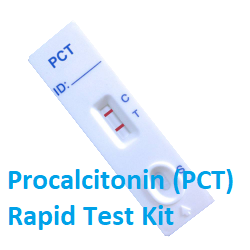Do We Need Procalcitonin for Sepsis in 2019?
 Procalcitonin (PCT) is the peptide precursor of calcitonin, a hormone that is synthesized by the parafollicular C cells of the thyroid. The reference value of procalcitonin in adults and children older than 72 hours is 0.15 ng/mL or less.
Procalcitonin (PCT) is the peptide precursor of calcitonin, a hormone that is synthesized by the parafollicular C cells of the thyroid. The reference value of procalcitonin in adults and children older than 72 hours is 0.15 ng/mL or less.Severe bacterial infection, bacterial sepsis is associated with elevated serum procalcitonin levels (>2 ng/mL).
Early administration of antibiotics decreases mortality in sepsis. Delays in therapy for septic shock patients can lead to mortality rates as high as 7% per hour for the first 6 h. De-escalation of therapy at the time of clinical improvement is less clear, and clinicians frequently rely on judgment. Procalcitonin (PCT) levels, produced predominately by the thyroid gland but also the lungs and intestines, rise during acute tissue inflammation and tissue injury. PCT levels may prove to be a more accurate biomarker that can distinguish between nonspecific inflammation and bacterial infection. A PCT assay, recently approved by the FDA, has led to increasing use of this tool for both initiation and de-escalation of antibiotic therapy. Evidence does not support a reduction in mortality when clinicians use PCT-based algorithms; however, results are from data too heterogeneous to provide guidance as to which patients may benefit. Overall, the data suggest that PCT guidance reduces unnecessary antibiotic exposure (7.35 vs. 8.85 days, 95% CI (- 2.27 to - 0.71); P < 0.001).
Society of Critical Care Medicine (SCCM) guidelines endorse the use of the PCT assay to limit antibiotic exposure in patients with sepsis, and de-escalation of antibiotic therapy in patients originally presumed to have sepsis. Although this assay is another added tool to limit antibiotic exposure and a trigger to treat infection prospectively, it should not replace clinician judgment. The Infectious Disease Society of America recommends clinical criteria alone in diagnosis, but follow-up in treatment can be accompanied by PCT to guide therapy.


